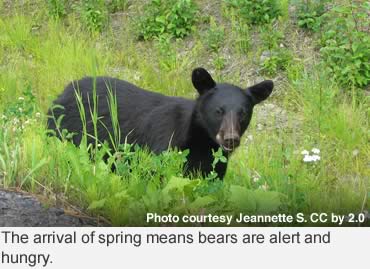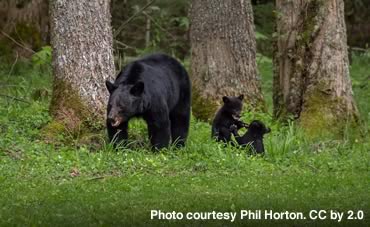Photo: This black bear appears to have quills in his nose from a porcupine encounter.
From Maine to Florida and Vermont to Missouri, and in all the central and western states where black bears are emerging from their winter dens, it’s time to be Bear Aware.
If you spend recreational time outdoors, the BearWise organization and state bear management coordinators are sharing advice on how to avoid conflict with bears.
It’s all about food.
“Bears become more active in spring, in search of things to eat, including female bears teaching their cubs where to find food,” says Mike Orlando, bear management coordinator for the Florida Fish and Wildlife Conservation Commission.
“This should not be a cause for concern,” agrees Andrew Timmins, game program supervisor for New Hampshire’s Fish and Game Department. “Building good bear-human relationships is far more successful when people are preemptive. It is easier to avoid a conflict than resolve one.
 “Bears have an extremely acute sense of smell, long memories and high intelligence. We really need residents to prevent emerging bears from returning to locations where they have been previously successful in finding backyard food sources.”
“Bears have an extremely acute sense of smell, long memories and high intelligence. We really need residents to prevent emerging bears from returning to locations where they have been previously successful in finding backyard food sources.”
Preemptive actions include some basic precautions.
Nate Bowersock, bear biologist with the Missouri Department of Conservation, says it’s important to remove or secure bear attractants such as bird feeders, trash, barbecue grills pet food and food waste.
Intentionally feeding bears can be dangerous, and in many states it is illegal.
“When bears lose their fear of humans, they could approach people in search of food or become defensive around food sources or territory they associate with people which could make them dangerous,” Bowersock says. “When this happens, the bear cannot be relocated and has to be destroyed. A fed bear is a dead bear.”
According to Jaclyn Comear, Vermont Fish and Wildlife bear biologist, “preventing bears from having access to human-related foods is key to successful coexistence with these long-lived and intelligent animals.” Taking down birdfeeders, making garbage and compost secure, protecting chickens and bees with an electric fence, will help teach bears that yards and neighborhoods are not good places to search for food.
 In Western states like Utah, game managers know bear conflicts increase during drought years when drought decreases normal food supplies for bears. This leads them to seek alternative sources of plants and root-like vegetation which make up 90% of a bear’s diet.
In Western states like Utah, game managers know bear conflicts increase during drought years when drought decreases normal food supplies for bears. This leads them to seek alternative sources of plants and root-like vegetation which make up 90% of a bear’s diet.
“Lower food supply could lead to more bear conflicts this summer as bears look more broadly for food,” says Darren DeBloois, Utah Department of Wildlife Resources game mammals coordinator. Bears have an amazing sense of smell and have no problem eating the same type of food that people eat. Conflicts between bears and people happen because bears start scavenging for food humans are eating and cooking while camping in the bear’s natural habitat.
BearWise basics in abnormally dry and rural areas vary from precautions for more urban environments. Bear proofing supplies and outdoor garbage cans, campsite cleaning, and removing all bear attractants are essential. Secure or clean anything in the yard that could attract a bear.
Basic rules of Bear Awareness
• Never Feed or Approach Bears
• Secure Food, Garbage and Recycling
• Remove Bird Feeders when Bears are Active
• Never Leave Pet Food Outdoors
• Clean and Store Grills and Smokers
• Alert Neighbors to Bear Activity
The BearWise organization’s mission is to help people live responsibly with black bears. Learn more here.
Maine is home to the largest population of black bears in the eastern United States. Find more information here.
In Florida, the arrival of spring means the time to prepare for increased bear activity.
Missouri advises bear awareness at this link.
In Utah, black bear country, increase your wild awareness here.